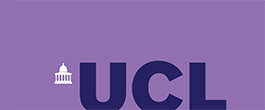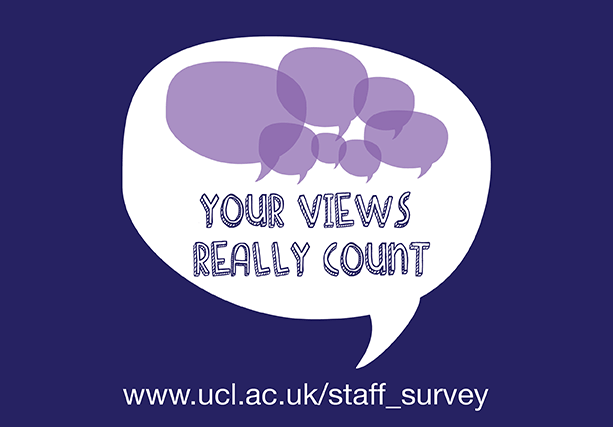You Said, We Did
In anticipation of the next UCL staff engagement survey, which will run from 4 - 22 November 2013, we thought it would be helpful to highlight to staff some of the key themes that emerged and examples of actions that took place in response.
What we Did
A strong cross-UCL focus has been to review, revise and refresh the Strategic Leadership and Leadership and Management programmes. In addition there is an enhanced Heads of Department induction programme, ensuring new Heads are supported to deliver across a range of responsibilities. There has also been an increased focus on local development initiatives, such as the SLMS Future Leaders programme. All these programmes recognise the important of leadership and management development across the disciplines. We have also launched new initiatives such as the B-MEntor scheme, a cross-institutional initiative designed to mentor BME academics and researchers from post-doc to lecturer to develop their potential.
Another important factor in assessing staff engagement is around values and direction. UCL values are expressed in the UCL White paper 2011 – 2021, however Professional services staff felt less engaged with UCL’s values and direction than academic and research staff. Under the Vice-Provost (Operations) an initiative was launched to develop values for professional services staff that feel relevant, promote joined up working and supports the academic mission.
Background
48% of staff participated in UCL's third all-staff engagement survey which was conducted in November 2011. This was our highest ever response rate with £40,590 donated to the Student Hardship Fund from the contribution from each returned questionnaire. The sample was broadly representative of UCL's staff profile.
The key objectives of the 2011 staff survey were to:
- benchmark developments since the previous survey in 2009
- understand what UCL has done well and what can be improved
- develop ideas for new projects and initiatives
The survey results indicated that we should:
a. celebrate and consolidate
- high levels of pride and advocacy of UCL as an employer;
- that most employees are interested in their work and gain a sense of personal accomplishment from it; and,
- that most employees have a degree of freedom and autonomy in how they work.
b. improve
- awareness of the values of UCL and how the goals and objectives of staff align to those of the University overall ;
- perceptions of the availability of resources and equipment required to work effectively; and,
- confidence in leadership and managerial competency.
c. investigate further
- how communications can be built upon to further embed the values and direction of UCL;
- whether line managers/academic leaders fully understand the scope of their role; and,
- whether there is a need to manage employees’ expectations about benefits.
Case Studies
The Provost’s Senior Management Team agreed that each Faculty would identify key local actions based on the ‘celebrate, improve and investigate’ model.
Below are a selection of local initiatives that have taken place since the last UCL all staff survey in 2011. For further information about the many other local initiatives contact your Staff Survey Champion, Dean/Head of Department or Faculty Manager.
School of Life and Medical Sciences
Issue: Concerns were raised about the lack of, or variable, communication across the faculties. This was exacerbated by the multi-site nature of many of the SLMS Divisions and Institutes.
Some people were not informed of important information in a timely manner. Others felt disenfranchised, not part of the decision making process.
What happened? A joint Faculty Communications Network has been established. From this a consistent, joined up website has been introduced, using common approaches.
Regular faculty newsletters have been produced with tailored messages from School, Faculty and Division. Balance d focus on research, teaching, enterprise and personal endeavour.
Key networks have been set up on HR, Finance/Research Admin, Communication and Education
School of Life and Medical Sciences
Issue: Some areas of concern in relation to equal opportunities, including gender balance in promotions and recruitmentWhat happened? A renewed focus on developing plans and initiatives to achieve Athena Swan award, with many departments working towards silver status. The Dean of Medical Sciences is championing Athena Swan on behalf of SLMS.
Launched in June 2005, the Athena SWAN charter recognises and celebrates good employment practices for women working in Science, Technology, Engineering, Maths and Medicine (STEMM) in higher education and research. It aims to assist the recruitment, retention and promotion of women in STEMM and promote good practice.
Bartlett Faculty of the Built Environment
Issue: Concerns were raised about insufficient resources, staff and a poor working environment
What happened? A new BEAMS Estates Strategy Manager post has been created. New space has been acquired, with more anticipated; and planning for the refurbishment of Wates House is underway; more staff have been recruited – both academic and professional services, with a positive impact on reducing the staff-student ratio; operating budgets have been increased.
Faculties of Engineering Sciences and Mathematical and Physical Sciences
Issue: Quality of appraisals is variable, leading to potential inconsistency of reward and feelings of inequality o approach
What happened? Senior management have reiterated the importance of high quality and consistent appraisals to support the achievement of excellent performance across the board. New managers receive development opportunities in appraisal to ensure quality and consistency of approach. Objective setting and assessment of performance is rigorously reviewed in relation to performance related reward, including additional increments.
Faculties of Arts and Humanities and Historical and Social Sciences
Issue: Concerns were expressed that workloads were too high, people were unable to take sufficient breaks during working hours and targets and deadlines were unrealistic, resulting in a long hours culture.
What happened? A Joint Faculty Work-Life Balance working group has been convened. This is looking at several areas where improvements can be made including: guidance aimed at lowering email traffic outside of working hours; promoting flexible working options, including P/T working and working from home and reviewing staffing levels both at staff:student and academic: professional services support.
Finance and Business Affairs Division
Issue: Staff wanted to see management be more open and honest in communications with them. Opportunities for questioning the way things are done and offering suggestions felt limited.
What happened? A new internal communications strategy has been developed and implemented. A resulting communications plan is in progress, including new website design enabling clearer communication.
Feedback mechanisms for Finance and Business Affairs (FBA) staff have been reviewed, with a strong emphasis on confidentiality & senior-level review.
Quarterly half-day events are organised to enable FBA staff to mix and share ideas.
Library Services
Issue: Communication between managers and staff and across sites needed to be improved.
What happened? A new Library Blog has been launched, which will be a new forum for communication between managers and staff, and between staff themselves. The aim of this development is to improve the communication of information/sharing of ideas to inform development and decision making.
A co-ordinating role for Communications activity has been identified as a key need in any future restructuring plans for the Library and UCL Communications will be invited to undertake an audit of Library’s communications activity.
Staff Survey Champions
Please contact your staff survey champion for more information about action in your area:
Name |
Faculty/ Area |
|
Graham Hart |
SMT |
|
Cathy Brown |
A&H and SHS |
|
Geoff Dunk |
Brain Sciences |
|
Steve Bunting |
Built Environment |
|
Johanna Novales |
Engineering |
|
Matthew Grigson |
Laws |
|
Bron Lord |
Life Sciences |
|
Oli Usher |
MAPS |
|
Sam Photiades |
Medical Sciences |
|
Rikke Osterlund |
Population Health Sciences |
|
Christopher Cullen/ |
V-P Education |
|
Julia Şahin |
V-P Enterprise |
|
Lisa Balderson |
V-P International |
|
Sally MacDonald |
V-P Professional Services |
|
Alexandra Iglesias |
V-P Research |

